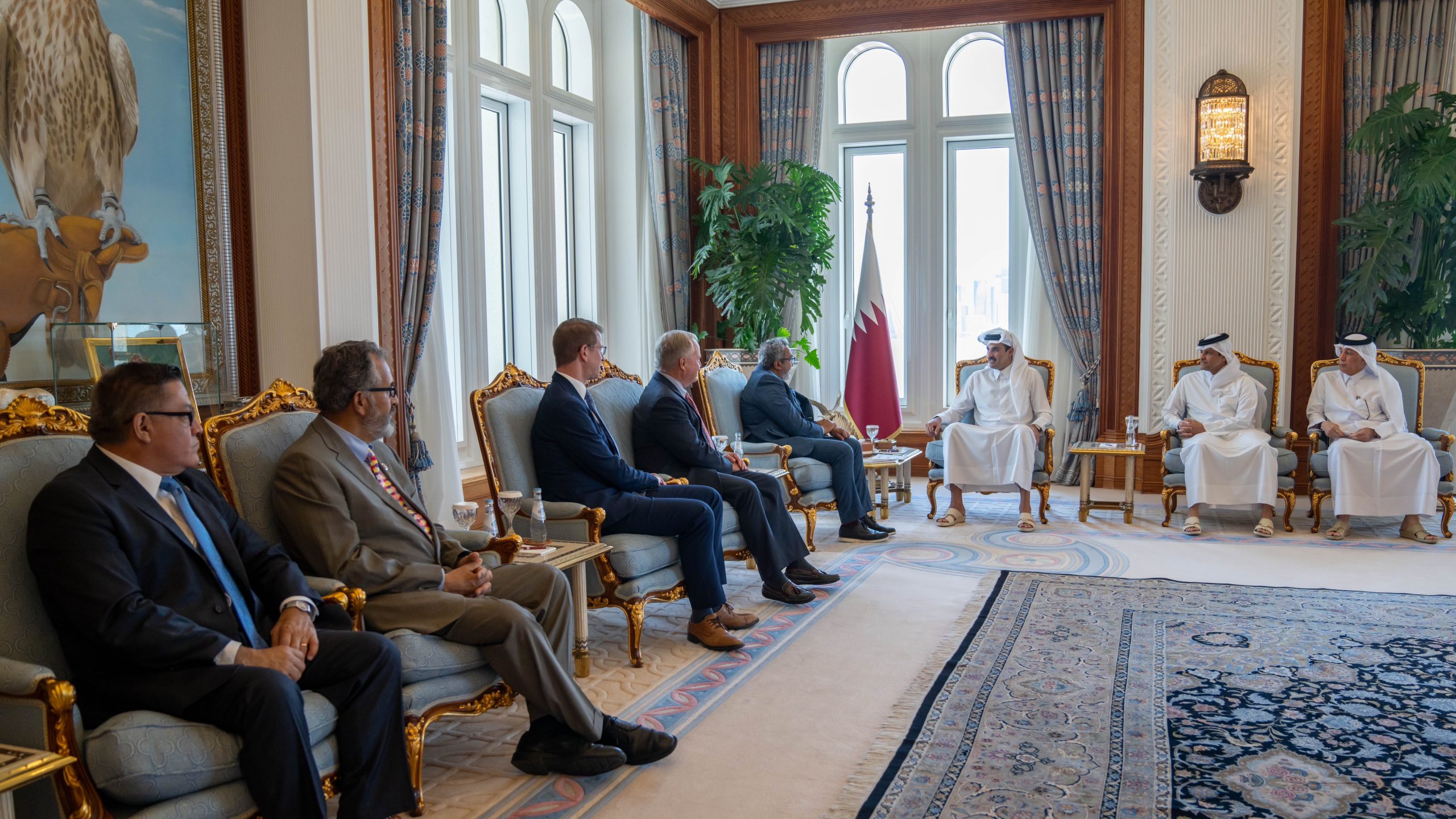The discussions tapped into Qatar’s mediation efforts in numerous files, including Venezuela, Afghanistan and Gaza.
Qatar’s Amir Sheikh Tamim bin Hamad Al-Thani met members of the U.S. Congress on Sunday at the Amiri Diwan in Doha, where the discussions centred on regional developments.
The U.S. officials included Representative Salud Carbajal, Representative Dave Joyce, Representative Ami Bera, Representative Derek Kilmer, Representative Juan Vargas and Representative Lance Gooden.
“During the meeting, they discussed friendship ties and strategic cooperation between the two countries in multiple fields, in addition to exchanging viewpoints on regional and global developments,” Amiri Diwan said in a statement.
The Congress members also met Qatar’s Prime Minister and Minister of Foreign Affairs Sheikh Mohammed bin Abdulrahman Al-Thani at the Ritz-Carlton Doha hotel.
The discussions focused on Doha and Washington’s “close strategic ties and ways to strengthen them” as well as the developments in Gaza. With Qatar’s mediation efforts ongoing, the matter was part of the discussions on Sunday.
A separate meeting took place with Qatar’s foreign ministry spokesperson Majed Al Ansari.
Similarly, the discussions tapped into the joint mediation efforts to end the war in Gaza as well as other mediation files including the Russian-Ukrainian crisis, Afghanistan, and Venezuela.
Qatar is a major non-NATO ally, a designation it earned in 2022 during a meeting between Qatar’s Amir Sheikh Tamim bin Hamad Al Thani and U.S. President Joe Biden.
The designation provides Washington’s foreign partners with several benefits in areas concerning defence, trade and security cooperation.
It came in recognition of Qatar’s role as a reliable ally, given its major efforts in 2021 in light of the Taliban takeover of Kabul.
At the time, Qatar and the U.S. cooperated in mass evacuations of more than 80,000 Afghans and foreigners, which became known as history’s largest airlift of people.
The Gulf state hosts the Al-Udeid Airbase, the largest American military post in the Middle East.
In January, the U.S. agreed to extend its military presence at a base in Qatar for another decade.
Qatar has also played key mediation roles since last year.
On December 21, 2023, Qatar’s mediation resulted in a prisoner exchange deal of 11 prisoners between the U.S. and Venezuela. The swap marked the largest release of US prisoners in Venezuela’s history, according to the Associated Press.
Doha also stepped as an interlocutor between the U.S. and Iran in an effort to revive the 2015 nuclear deal, formally known as the Joint Comprehensive Plan of Action (JCPOA).
This resulted in a historic deal on September 18, 2023, which saw the release of five Iranians and five Americans as well as the unfreezing of $6 billion in Iranian assets overseas.
More recently, Qatar has been playing a crucial role in hopes of achieving a ceasefire in Gaza by mediating between Hamas and Israel. The Gulf state has been hosting Hamas’s political office since 2012 at Washington’s request to maintain channels of communication.
This proved to be an effective move as it helped throughout past and current mediation efforts in Gaza.
Last year, mediators Qatar and Egypt reached a week-long truce deal that saw the release of 109 captives from Hamas.
The talks have since stalled as Israel continued its relentless genocidal war on Gaza where it killed more than 35,000 people.
Israel intensified its brutal aggression on Gaza despite Hamas agreeing on a deal proposal presented by Qatar and Egypt.
Last week, Israeli Prime Minister Benjamin Netanyahu approved the invasion of Rafah City in southern Gaza following months of threats.
Israeli occupation forces invaded the Gaza-Egypt Rafah Crossing on May 6 while launching deadly airstrikes on its surrounding areas.
The United Nations had warned of “an epic humanitarian disaster” if Israel launched a full-scale invasion of Rafah.
Rafah is densely populated with 1.4 million people, many of which were initially ordered to evacuate the north while the southern city was declared to be a safe zone.
There are at least 600,000 children in Rafah, described by the UN’s Children Agency (UNICEF) as “the city of children.”
Since last week, around 300,000 people have been forced to flee Rafah with nowhere safe to go, the UN’s agency for Palestinian refugees (UNRWA) said on Sunday.
On Monday morning, Israel launched deadly attacks on Rafah and Jabalia as reporters on the ground pointed to Israeli tanks entering both areas.
Al Jazeera’s correspondent in Deir El Balah, Tareq Abu Azzoum, reported that the “tanks and troops are advancing deeper into the eastern and central parts” of Jabalia camp. Abu Azzoum added that the Israeli military encircled and besieged six evacuation centres.
Meanwhile, the U.S. has been under significant pressure to push for an immediate ceasefire and take a hard stance against its ally, Israel.
Speaking to CNN on May 9, President Biden publicly said he would halt the shipments of weapons to Israel if Netanyahu ordered a full-scale invasion of Rafah. Israel’s other staunch ally, the United Kingdom, described the move as “not a wise path.”
Notably, Britain was complicit in the Israeli occupation of Palestine through the 1917 Balfour Declaration, which led to the establishment of Israel as a “birthright” of Jews.
By 1948, the Israeli occupiers had forced out hundreds of thousands of indigenous Palestinians from their homeland in what is widely known as the “Nakba” or the catastrophe. To date, the UK has yet to formally apologise to Palestinians for the Balfour Declaration.
The genocide in Gaza is being widely described by Palestinians as the continuation or a renewed Nakba.







